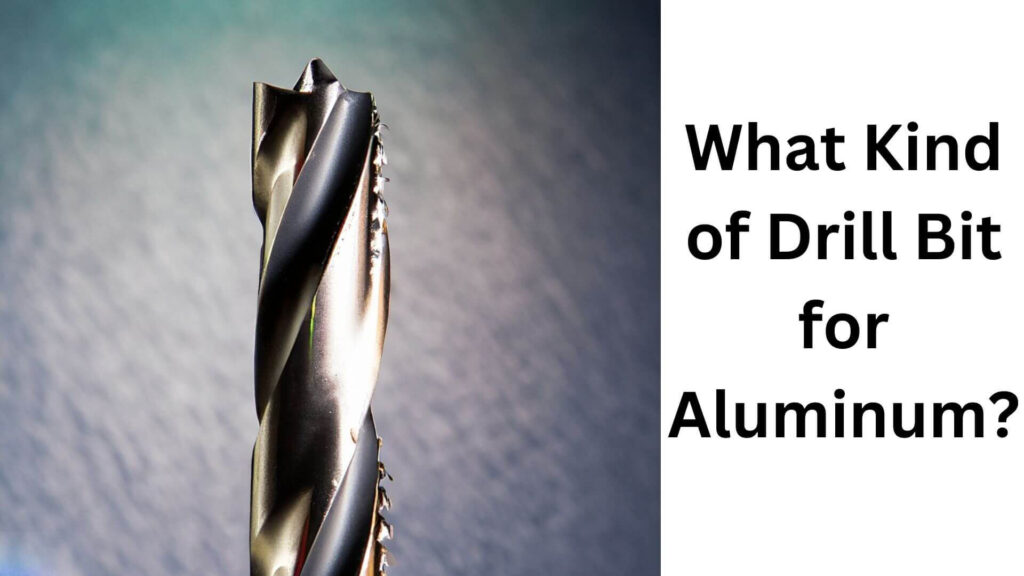For drilling aluminum, use a high-speed steel or cobalt drill bit. These bits are specifically designed to handle the softness of aluminium and prevent binding or warping.
Aluminium is widely used in various industries because it is lightweight, corrosion-resistant, and durable. Having the right tools and equipment while working with aluminium is essential to ensure optimal results without damaging the metal.
The drill bit makes precise holes in aluminium sheets, blocks, and other shapes. Choosing the correct type of drill bit for aluminium is crucial to avoid damaging the metal and achieving the desired hole size and shape.
High-speed steel or cobalt drill bits are the best-suited options for aluminium because they generate less heat, provide better chip evacuation, and resist wear and tear. This article will discuss the types of drill bits suitable for aluminium.
Check Also: Top-Rated Drill Bits for Aluminum
Table of Contents
Understanding Aluminum As A Material
Aluminium is widely used in various products, industries, and applications. It is lightweight, durable, and corrosion-resistant, making it an ideal material for everyday use. However, aluminium is a soft metal, making it difficult to drill through.
Thus, choosing the right drill bit for aluminium is essential to avoid damage to the material or the tool and to ensure efficient and effective drilling.
Properties Of Aluminum
Before we move into the drill bit options, let’s look at some of the properties of aluminium that make it unique.
- Aluminum is a soft and lightweight metal, which makes it easier to handle and transport.
- It is ductile, meaning it can be easily bent or shaped without breaking.
- Aluminum is a good conductor of electricity and heat.
- The metal is highly corrosion-resistant, making it suitable for outdoor and marine applications.
Types Of Aluminum
Different types of aluminium alloys have varying levels of strength, flexibility, and corrosion resistance.
Choosing the right drill bit for aluminium also depends on the kind of aluminium material you will be working on. Here are some of the most common types of aluminium:
- 6061 aluminium: Commonly used in structural and automotive applications due to its high strength and corrosion resistance.
- 5052 aluminium: A versatile aluminium alloy used in various industrial applications, including cookware and marine components.
- 2024 aluminium: A high-strength aluminium alloy with excellent fatigue resistance often used in aerospace applications.
- 7075 aluminium: A high-strength aluminium alloy used in aircraft and aerospace industries due to its strength and toughness.
The Importance Of The Right Drill Bit
Choosing the right drill bit for aluminium is crucial in achieving accurate and safe drilling. Using the wrong type of drill bit can result in the following problems:
- Tearing or gouging the materials being drilled
- Breaking or dulling the drill bit prematurely
- Damaging the equipment or the workpiece
- Creating rough or imprecise holes
Knowing the properties of aluminium and the different types of aluminium alloys is essential in selecting the right drill bit for your project. Careful consideration of the drill bit’s size, shape, and material is crucial to ensure efficient and effective drilling.
Remember that using the wrong drill bit for aluminium can cause costly mistakes, leading to project delays and safety hazards.
Read More: Can You Bolt Aluminum to Stainless Steel Drill Bits?
Types Of Drill Bits Suitable For Aluminum
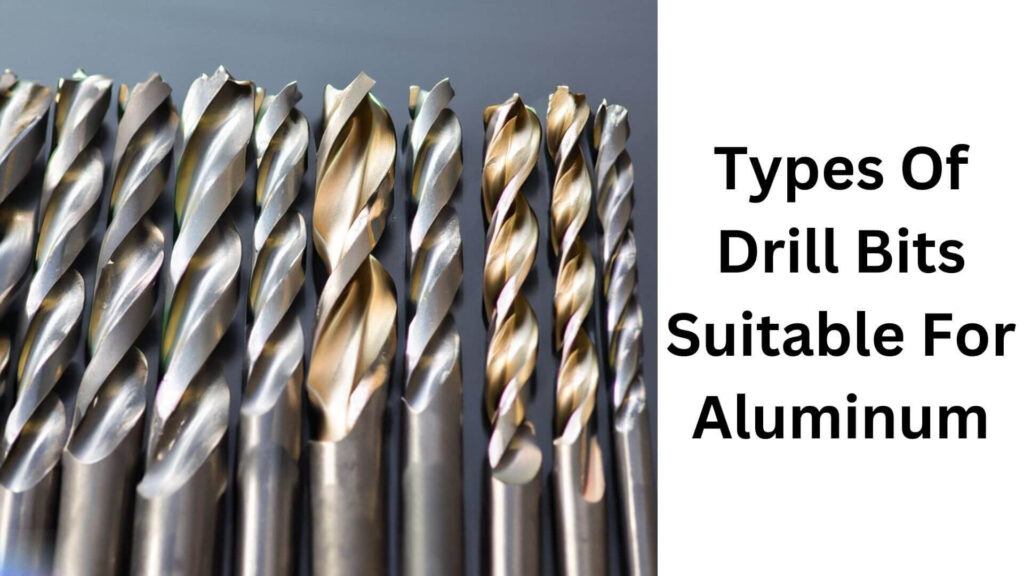
Aluminum is a delicate metal that requires special care when drilling. An ordinary drill bit, especially the one used for heavy-duty materials, won’t only damage aluminium but also blunt the drill bit. Therefore it’s essential to use a drilling bit explicitly designed for aluminium.
1. High-Speed Steel (Hss) Drill Bits
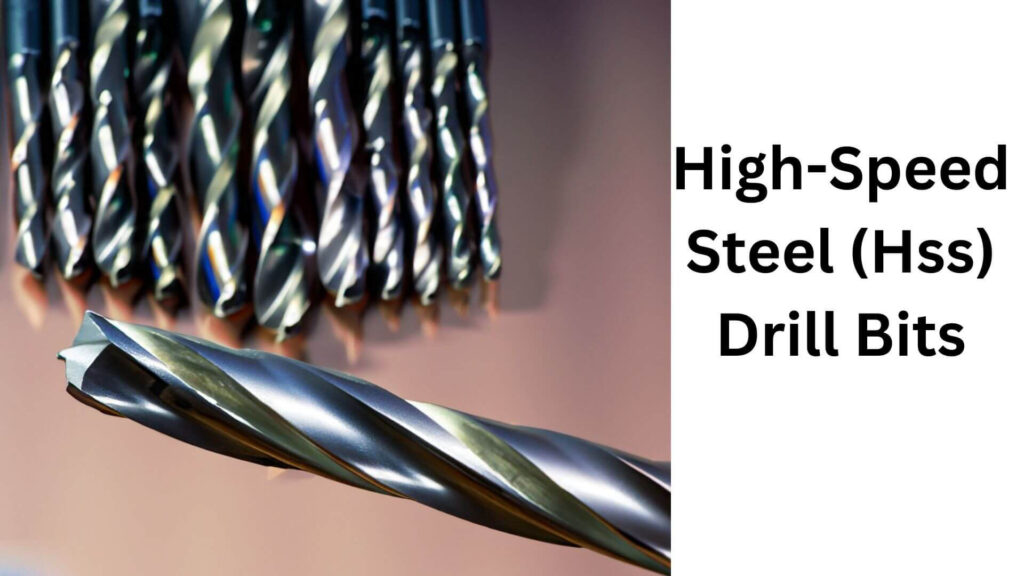
High-speed steel (hss) drill bits are famous for drilling aluminium for their affordability and versatility. They’re made from high-speed steel, a mixture of tungsten and carbon steel, making them strong enough to guide through most aluminium sheets.
Benefits Of Hss Drill Bits
- Hss drill bits are less expensive than others, making them the most accessible option.
- They can efficiently drill soft metals like aluminium without breaking or chipping.
- They’re relatively easy to sharpen, extending their lifespan.
Limitations Of Hss Drill Bits
- Hss bits might not be the best option for drilling more challenging aluminium sheets, as they can quickly turn dull.
- They’re less efficient than other speciality drill bits like cobalt or carbide.
2. Cobalt Drill Bits
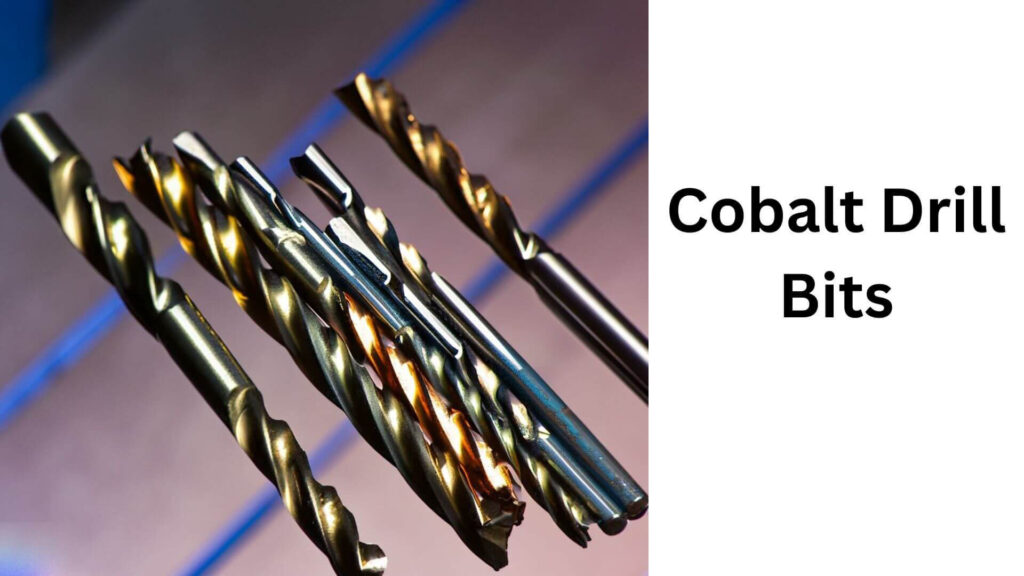
Cobalt drill bits contain a mix of cobalt and high-speed steel, giving them increased durability and strength. They’re ideal for drilling through more challenging grades of aluminium.
Benefits Of Cobalt Drill Bits
- Cobalt drill bits have a higher melting point, making them resistant to heat buildup, which can lead to them becoming blunt.
- They’re twice as hard and up to four times more durable than hss drill bits, making them an ideal choice for drilling through more challenging aluminium sheets.
- They produce cleaner holes with less burring.
Limitations Of Cobalt Drill Bits
- Cobalt drill bits are more expensive compared to hss drill bits.
- They’re more brittle, making them prone to breaking or snapping if misused.
3. Carbide Drill Bits
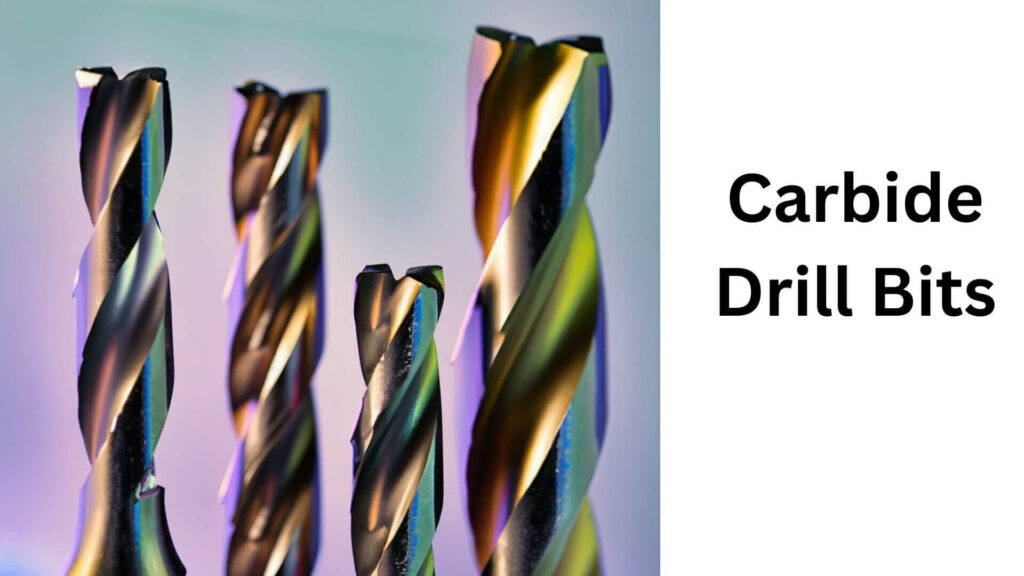
Carbide drill bits are the industry’s most robust and durable, ideal for drilling through rigid materials like aluminium. These are your go-to drill bits for the most brutal aluminium sheets.
Benefits Of Carbide Drill Bits
- Carbide drill bits are the most durable of all drill bits due to their strong carbide material.
- They withstand high temperatures and extend their lifespan.
- Carbide bits produce clean and precise holes in aluminium sheets.
Limitations Of Carbide Drill Bits
- Carbide bits are significantly more expensive than other options.
- They’re brittle and should never be used on smaller diameter holes as they are prone to breakage.
4. Diamond-Coated Drill Bits
Diamond-coated drill bits are coated with diamond particles, giving them high abrasion resistance and a long lifespan. They’re ideal for drilling through complex and challenging materials like aluminium.
Benefits Of Diamond-Coated Drill Bits
- Diamond-coated drill bits have a long lifespan due to the diamond particles embedded in their tips.
- They produce exact holes with clean edges.
- Diamond-coated drill bits are perfect for drilling through reinforced aluminium sheets.
Limitations Of Diamond-Coated Drill Bits
- These drill bits are expensive compared to others, and you’ll need to exercise extreme care while using them.
- They’re more delicate and require careful usage to prevent the diamond coating from chipping.
Choosing the right drill bit to prevent damage is essential which is the most commonly used when drilling aluminum.
However, it’s critical to remember that you should always use the appropriate lubricant while drilling to ensure your drill bit’s lifespan is extended.
Read More: Effective Techniques for Extracting a Broken Drill Bit from Aluminum
Factors To Consider When Choosing A Drill Bit For Aluminum
Aluminum is a popular material for diy enthusiasts. Choosing the right drill bit is crucial. Here are the factors to consider when selecting a drill bit for aluminium.
1. Speed And Feed
The speed and feed are significant factors to consider when drilling through aluminium. Here’s what you need to keep in mind:
- Use a high-speed drill bit with a speed of 2000 rpm or higher.
- Maintain a constant rate during drilling while avoiding heating the aluminium.
- Use low feed pressure and reduce the rate if the drill bit starts to overheat or chatter.
Flute Geometry
Flute geometry, the shape, and size of the drill bit’s grooves, affects the drilling’s efficiency. Here’s what you need to know:
- Choose a drill bit with a flatter and broader flute for efficient chip removal.
- Avoid using a drill bit with a narrow flute, as it can clog quickly, reducing the efficiency of the drilling process.
Coating Type
The coating type can improve the drill bit’s lifetime while enhancing the drilling process’s accuracy. Here’s what you need to consider:
- Consider using a high-speed steel (hss) drill bit with a black oxide coating or a titanium nitride coating.
- The black oxide coating increases the drill bit’s lifetime, while the titanium nitride coating enhances the drilling accuracy.
Shank Type And Size
The shank is the part that fits into the drill chuck, and its size and type should be suitable for your drilling machine. Here’s what you need to know:
- Choose a drill bit with a straight shank that fits snugly in the chuck to prevent wobbling.
- Consider using a drill bit with a larger diameter shank for better stability.
Point Angle
The point angle determines the drill bit’s sharpness and penetration ability and affects the efficiency of the drilling process. Here’s what you need to know:
- Consider using a drill bit with a 118° point angle, which is standard for most drilling machines.
- A higher point angle drill bit for thicker aluminium can make the process quicker.
Choosing the right drill bit is crucial for efficient and accurate drilling through aluminium. Ensure you consider all the above factors when selecting a drill bit to guarantee the best results.
Preparing The Aluminum Surface For Drilling
Aluminum is a popular material utilised in the manufacturing industry due to its versatility, lightweight, and corrosion resistance properties.
However, working with aluminium can be challenging when it comes to drilling. Choosing the appropriate drill bit and preparing the aluminium’s surface for drilling is essential to acquiring efficient results.
Here I will explore how to prepare the aluminium’s surface for drilling and the appropriate drill bit.
1. Cleaning The Surface
Before drilling into aluminium, it is crucial to thoroughly clean the surface to avoid any impurities affecting the drilling process. Here are some of the key points to keep in mind when you need to clean the aluminium’s surface:
- Use a degreaser, and a clean cloth or brush, to remove any oil, dust, or dirt from the aluminium’s surface. This can be done by wiping the surface with an appropriate solvent.
- You can use fine-grit sandpaper to remove stubborn dirt gently.
- Do not use steel wool or abrasive cleaners to clean an aluminium surface, as this can scratch the surface and damage it.
- After cleaning, let the surface dry completely before marking where to drill.
2. Marking The Drilling Point
To avoid any mistakes while drilling, mark the drilling point on the aluminium surface before hitting it. Here are some necessary guidelines when marking the drilling point:
- Use a centre punch or a sharp nail to keep the drilling point.
- Keep where you want the drill bit to penetrate the aluminium surface.
- Use a template to drill several holes close together or at regular intervals. This will help you to be more precise.
3. Clamping The Aluminum
Once you’ve marked where to drill, it’s time to clamp the aluminium to a stable surface. Clamping ensures that the aluminium doesn’t move or vibrate while drilling, which can lead to mistakes or uneven holes. Here are some vital points to take into consideration when clamping the aluminium:
- Use a drill press with a clamp or secure the aluminium piece to a vise to keep it in place.
- Place scrap material under the aluminium to prevent the drill bit from biting into the table or work surface when it emerges from the other side.
- Using a lubricant will help to ease the drilling process and keep the surface and the drill bit cool.
Understanding how to prepare the aluminium surface for drilling is essential to produce perfect holes. Cleaning the surface, marking the drilling point, and clamping the aluminium piece will help you achieve good results.
These steps will enable you to drill safely and correctly with minimal damage to the aluminium surface.
Now you can choose the appropriate drill bit for aluminium and start your drilling activities.
Best Practices For Drilling Aluminum
Aluminum is a soft metal that requires specific drill bits and techniques to avoid damaging the material. Let’s explore the best practices for drilling aluminium.
1. Proper Use Of Lubricant
Using lubricant is crucial when drilling aluminium to minimise friction and heat, reducing the risk of damage to the material. Proper use of lubricant is essential to ensure a smooth drilling experience.
Here are a few tips:
- Use oil as a lubricant for aluminium drilling
- Apply lubricant to the drill bit’s information before beginning the drilling.
- Reapply lubricant periodically during the process.
2. Correct Cutting Technique
The correct cutting technique is vital to drill a clean hole through aluminium. The following tips will help you achieve a smooth cut:
- Use a drill bit designed for aluminium.
- Begin drilling at a low speed, gradually increasing the speed to prevent damage.
- Keep the drill bit perpendicular to the material.
- Apply steady, consistent pressure while drilling.
3. Cooling The Drill Bit
The temperature of the drill bit can increase significantly while drilling, increasing the risk of overheating and damaging the material. The tips below can help keep the drill bit cool:
- Use a spray bottle to mist the drill bit with water during the process gently.
- Use specialised drill bits that have coolant channels built-in.
- Let the drill bit cool off between uses.
4. Avoiding Overheating The Aluminum
Overheating the aluminium can deform or damage the material, which can be costly, not to mention a waste of time. Therefore, it is essential to avoid overheating when drilling aluminium. Here are some tips to prevent overheating:
- Use a cutting fluid or oil to lubricate the drill bit.
- Ensure that the drill bit is of the correct size to prevent overheating.
- Drill in pulses, stopping every few seconds to avoid overheating the material.
You follow these best practices when drilling aluminium to achieve a clean and precise hole without damaging the material.
Frequently Asked Questions On What Kind Of Drill Bit For Aluminum
What Is The Best Type Of Drill Bit For Aluminum?
For the best results, use high-speed steel (hss) or cobalt drill bits made explicitly for aluminium.
Can You Use Regular Drill Bits On Aluminum?
Regular drill bits made for wood or metal may work but dull quickly and do not produce clean holes.
What Is The Right Speed For Drilling Aluminum?
The recommended speed for drilling aluminium is 2000 rpm. Using a lower speed can cause the bit to overheat.
Do You Need To Lubricate Aluminum When Drilling?
Aluminium must be lubricated when drilling to prevent the bit from overheating and to produce clean holes.
Can You Drill Through Thick Aluminum With A Regular Bit?
You can drill through thick aluminium with a regular bit, but it may take longer and require more lubrication. A specialised bit is recommended for thick aluminium.
Conclusion
It is vital to choose the right drill bit when working with aluminium. Failure to do so can lead to poor results, damaged material, and wasted time and effort. Fortunately, various drill bit options are available for aluminium, ranging from traditional twist drills to specialised options.
The most popular drill bits for working with aluminium include high-speed steel (hss) drill bits, cobalt drill bits, and carbide drill bits.
Each type of drill bit features unique properties and advantages that make them ideal for specific applications. For example, choosing the right drill bit will ultimately depend on the type and thickness of the drilled aluminium and the desired results.
By following these guidelines and selecting the right drill bit for your project, you can ensure that you achieve the best possible results and make your project a success.

Hey, I am MD Hrithik Hossain, I’m a huge fan of DIY crafts. My workshop is where I spend most of my spare time, and I’m always working on some project. To that end, I’d like to share some of my knowledge and experience with you in power tools, woodworking, and other specialized materials fabrication.
I will guide you with genuine knowledge that can assist you with deciding whether a drill is appropriate according to your requirements or not. If you want to find the best drill and know which type of drill is most suited for your needs, then I can guide you with my expertise. My passion lies in helping others find the correct products they need at an affordable price.

